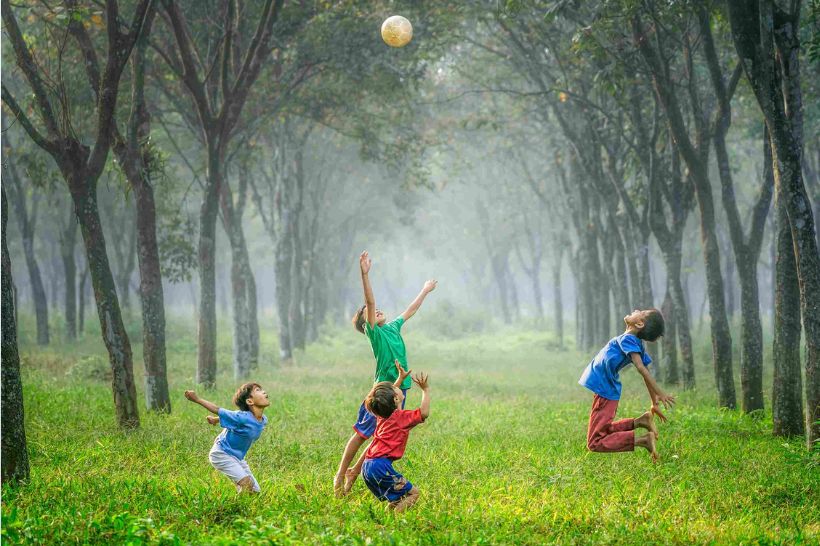As children do you remember when we played rock, paper scissors? Made lines with white chalk and played hopscotch and jumped around throwing little pebbles we had handpicked for ourselves?
I grew up with very little structured playtime. We were out every evening just having fun with other kids who lived around my house.
Most parents today seem to feel that good parenting means preparing their children to excel in everything. In trying to do this, we try and expose them to various after-school organized activities. As a result, often lost is the time for a child to just play.
In today’s predominantly digital world, our kids are spending more and more of their time on some sort of device. And while there is certainly much to be learned, explored, and created using devices, there are skills that devices can’t always teach — and that children need to learn.
As per an article in Harvard Health Publishing, Claire McCarthy, MD, a primary care paediatrician at Boston Children’s Hospital says
I think that also, parents and children are literally forgetting how to play. Parents used to bring toys to entertain their children while they waited to see me; now they just hand their child their phone. Devices are so ubiquitous and easy, it can take real effort to put them aside and find something else to do.
She also suggested some fun games for kids of 4-7 years
- Freeze Dance, Red Light Green Light, Simon Says, or Duck Duck Goose are all games that get kids active while reinforcing self-regulation and cooperation.
- I Spy, Bingo (or Opposites Bingo, where families make their own picture boards and kids have to match the opposite to what is said), and other matching games are great for building memory and cognitive skills.
- Try starting a story and having others add to it to see what plot twists emerge! It’s a great way to encourage creativity. You can do something similar with a drawing: start with something simple, like a house or a boat, and take turns embellishing this, narrating as you do.
Let me share what German-American psychoanalyst Eric Erikson says about play
You see a child play, and it is so close to seeing an artist paint, for in play a child says things without uttering a word. You can see how he solves his problems. You can also see what’s wrong. Young children, especially, have enormous creativity, and whatever’s in them rises to the surface in free play.
On the same note, as early as 1907 Maria Montessori, an educator best known for her philosophy of education said
We cannot know the consequences of suppressing a child’s spontaneity when he is just beginning to be active.
But despite all these benefits, we’re still not playing enough. …Why?
When children play, they laugh, experiment, and don’t worry about getting things wrong and that’s the beauty of it all. I have seen it with my kids, when they play, it’s their safe space where they can hone their ways of thinking, creating, and testing ideas while being resilient to failures! All skills they’ll need to progress and develop throughout their lives.
Recently Adam Grant, NYT bestselling author & organizational psychologist talked about the importance of play and how a child’s mental health suffers if they don’t have the opportunity of free play.
At a recent Round Table on PLAY powered by the LEGO® Group, we got some experts and parents to talk about how important play is for a child.
Dr Swati Popat Vats President of Early Childhood Association & Podar Education Network says “Play is childhood’s work”. Do you agree? Parents need to educate themselves to understand how deeply PLAY actually impacts their child’s problem-solving skills, creativity, and critical thinking.
Varun Duggirala – Co-founder of Plot Device Entertainment, Creator & Author is very conscious about teaching his daughter that she doesn’t need to do something for her teacher or her parents – she should do whatever she loves for herself. Kids shouldn’t be put under any pressure.
Dr Shwetambara Sabharwal – Parent, Psychologist and Columnist can’t emphasize enough how crucial PLAY is for kids (and adults) to think, communicate, learn & socialize.
Bhavana Mandon – Marketing Director, The LEGO® GROUP is spot on when she says that we need to encourage our kids to PLAY more without putting them into boxes and measuring them based on their grades.
Opportunities for play take different forms depending on personal interests and as a parent, you should find opportunities. There are no rules when it comes to playing and we should allow our kids to just have fun while learning and playing. The way their faces light up when they can make something out of nothing makes it all worthwhile.
Take some time off every day and play with your kids and help them grow, learn, create and develop while having fun!
What are your thoughts?
















